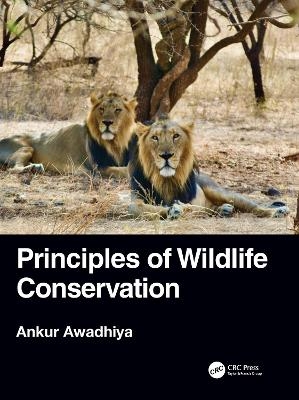
Principles of Wildlife Conservation
CRC Press (Verlag)
978-0-367-47993-0 (ISBN)
Wildlife tend our forests — they pollinate flowers, disperse seeds, eat insects that harm trees, and keep herbivores and diseases in check. They keep our forests healthy and resilient — ready and able to face and counter any challenges, such as global warming and climate change. They are the individual cogs that keep the forest machine functioning. And we desperately need our forests — to sequester carbon, to purify our air and water, to protect our soils from getting eroded, and to save our dams and waterways. Wildlife do need our care, concern, and attention, but we also need our wildlife — perhaps much more sincerely. A majority of wildlife arrived on this planet much before humans, and the Earth belongs to them as well.
So how do we conserve wildlife? This is the question that Principles of Wildlife Conservation seeks to answer. It presents a lucid — cogent, yet simple — narration about the why’s and how’s of conserving wildlife. It begins with the first principles — and thus requires no prerequisite other than an urge to seek knowledge. It is full of pictures and case studies from the field — to facilitate easy grasping of the subject. The book builds a solid foundation of the theory of wildlife conservation, and tops that up with experiences from actually doing wildlife conservation. In this way, it equips the reader to master both the science — and the art — of conserving wildlife.
Dr. Ankur Awadhiya (b. 1987) is an IFS officer of 2014 batch borne on the Madhya Pradesh cadre. Trained as an engineer, he earned his B. Tech in Biological Sciences and Bioengineering in 2009 from IIT Kanpur, followed by a Ph.D from IIT Kanpur in 2015, AIGNFA (Honours Diploma) from IGNFA Dehradun in 2016 and Post Graduate Diploma in Advanced Wildlife Management (Honours Diploma) from WII Dehradun in 2018. He maintains a keen interest in academics and research and has been a recipient of several honours including the NTSE scholarship, KVPY fellowship, Shri P. Srinivas Memorial prize, K. P. Sagriya Shreshta Vaniki puraskar and the S. K. Seth Prize. Besides academics, he maintains a passion towards photography, painting, movie-making, and creative literary pursuits.
Introduction. Organisation of life. Population growth and community organisation. Threats to wildlife resources. Wildlife monitoring. Wildlife disease management. Animal restraint and immobilisation. Wildlife genetics. Habitat management. Ex-situ and in-situ conservation. Emerging aspects of wildlife management. References. Index.
| Erscheinungsdatum | 16.07.2021 |
|---|---|
| Zusatzinfo | 17 Tables, black and white; 32 Line drawings, black and white; 42 Halftones, black and white; 74 Illustrations, black and white |
| Verlagsort | London |
| Sprache | englisch |
| Maße | 210 x 280 mm |
| Gewicht | 920 g |
| Themenwelt | Technik ► Umwelttechnik / Biotechnologie |
| Weitere Fachgebiete ► Land- / Forstwirtschaft / Fischerei | |
| ISBN-10 | 0-367-47993-1 / 0367479931 |
| ISBN-13 | 978-0-367-47993-0 / 9780367479930 |
| Zustand | Neuware |
| Informationen gemäß Produktsicherheitsverordnung (GPSR) | |
| Haben Sie eine Frage zum Produkt? |
aus dem Bereich


